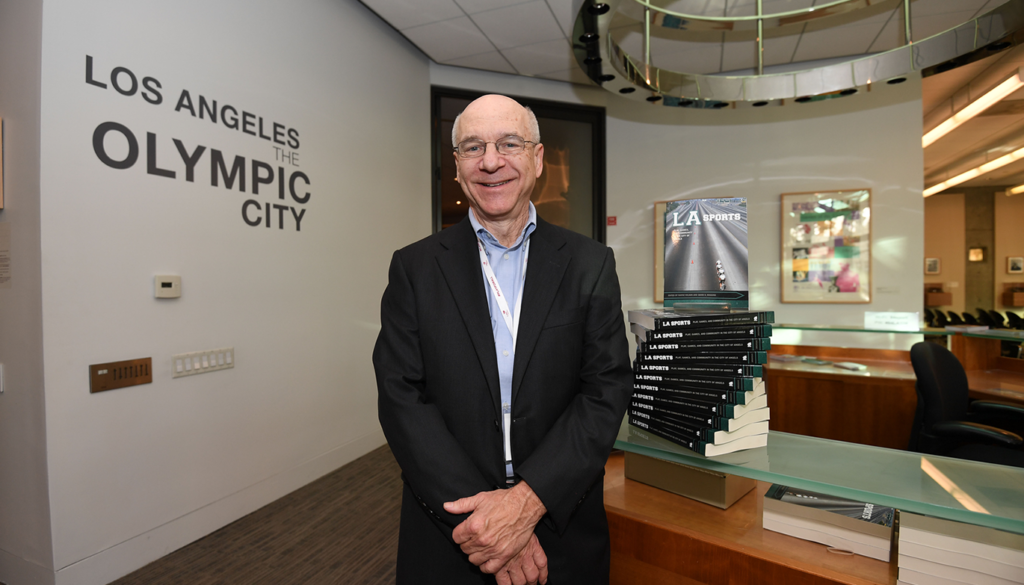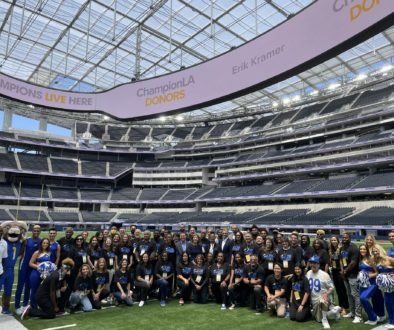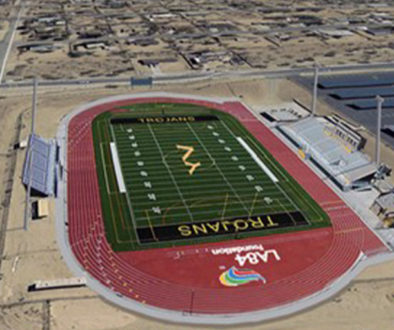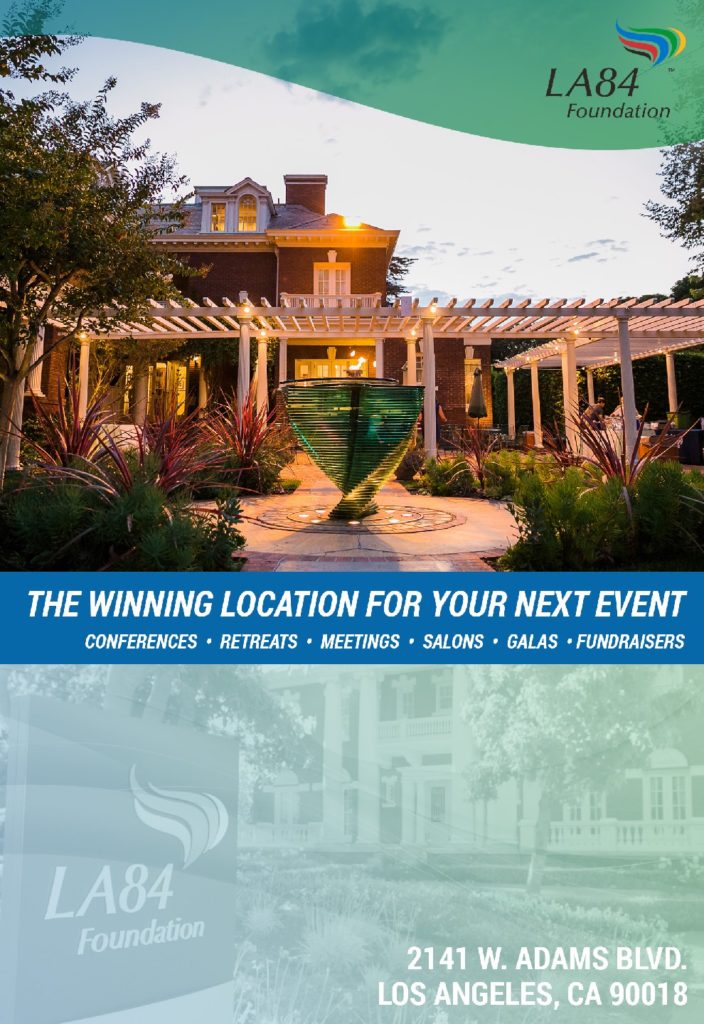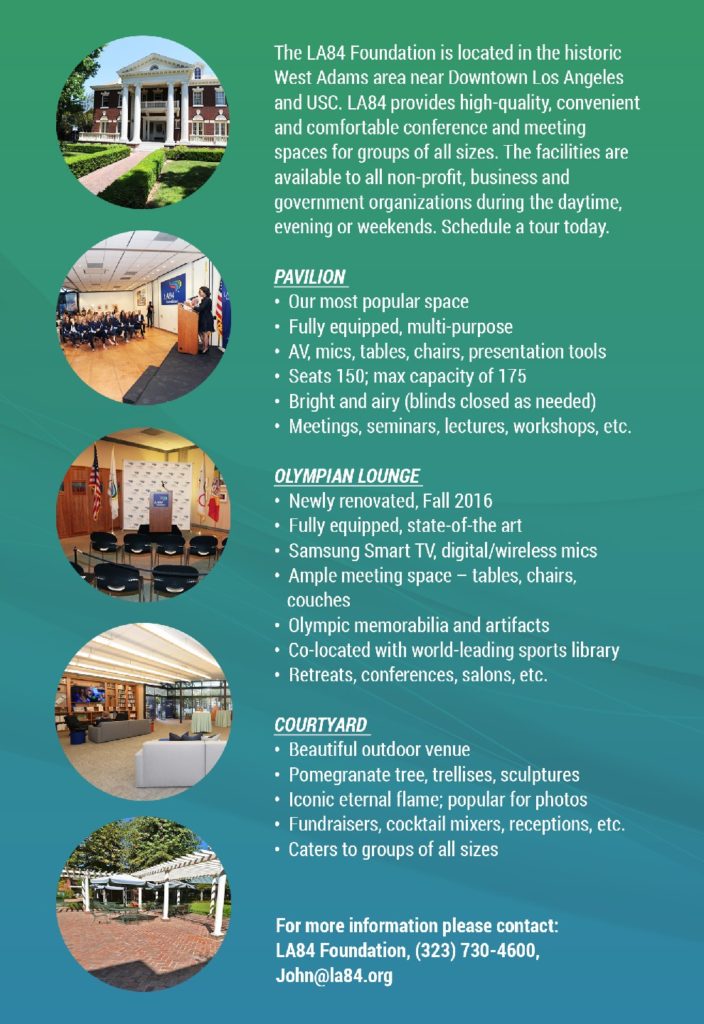Wayne Wilson, Scholar and Friend, Leaves Legacy
By David Davis
Last week, some 200 people gathered at LA84 Foundation headquarters to celebrate the publication of a unique book and to celebrate the retirement of a unique staff member.
LA Sports: Play, Games, and Community in the City of Angels (University of Arkansas Press) is co-edited by Wayne Wilson, LA84 Foundation’s vice president for education services, and George Mason University professor of sport history David K. Wiggins. According to Wilson, LA Sports is the first-ever general collection of scholarly articles to examine the ever-morphing sports scene in Los Angeles.
“While there have been scholarly books that focused on specific aspects of sport in Los Angeles, there’s never been a general approach to the topic like the one we’re taking here,” he said. “There are books that are specifically on the 1932 or 1984 Olympic Games or the Dodgers’ moving to Los Angeles, but there’s no scholarly work that I’m aware of that looks at sport in Los Angeles in a comprehensive way.”
As the book’s introductory essay notes, Los Angeles is synonymous with major events. The city and its SoCal environs have hosted two Olympic Games (with a third on the horizon in 2028), Super Bowls, World Cup finals, Rose Bowls, and the X Games, not to mention multiple World Series, NBA Finals, and Stanley Cup games. Chapters in the book examine both the 1932 and 1984 Olympic Games and show how their successes managed to silence critics and naysayers.
But L.A.’s athletic tapestry resonates well beyond these headline-making events: it’s an entertainment hub that has produced beloved sports films that use SoCal as location like Bad News Bears, Karate Kid and Love and Basketball; sports films like Tin Cup and Kingpin; it invented and/or popularized sports such as BMX, skateboarding, and beach volleyball; it has served as the setting for Fernando-mania and the “Dogtown and Z-Boys” skateboarding scene.
What makes Los Angeles different, Wiggins said, is “the rich diversity of sports at all levels of competition. I think the climate is conducive to having a large number of activities: you’ve got beach volleyball, Muscle Beach, car racing, bicycling and surfing. You’ve got the elite professional sports franchises, from the Dodgers to the Lakers to the Kings to the Galaxy, and it’s also remarkable in terms of intercollegiate athletics.”
The region’s racial and ethnic diversity, Wilson said, is another component that differentiates L.A. from other places. The chapter “On Los Chorizeros, the Classic, and El Tri,” written by associate professor of history at UC San Diego Luis Alvarez, addresses how Mexicans in Los Angeles built community and claimed belonging through sport activities and fandom. “This is a city where half the population is Latino,” said Wilson, “and most of the Latinos are Mexican-Americans. We wanted to be sure that we talked about Latinos in sport in Los Angeles because that tends to be overlooked by the mainstream media.”
Said Wilson: “Sport has the ability both to divide people and to bring them together. In the chapter about [Dodgers announcer] Vin Scully, one of the points the authors [Elliott Gorn and Allison Lauterbach Dale] make is that Scully had the remarkable ability to unite people across all kinds of ethnic groups and income brackets. In that sense sport was a unifying factor.”
The evening also gave friends, family, scholars, Olympians, and co-workers the chance to say farewell to Wilson, who is retiring after more than 30 years at the LA84 Foundation. Speakers saluted Wilson’s extraordinary contributions to the field and to the organization. And, they tried to roast him with a list of the top ten things they will miss most about Wilson. (#1: “Everything!”)
Wilson joined the LA84 Foundation (known then as the Amateur Athletic Foundation of Los Angeles) in December of 1987, six years after earning his Master’s Degree in Library Science from Syracuse University. His charge was to turn an assortment of books, periodicals, scrapbooks, memorabilia, and Olympic-related documents into a bona fide sports library of national and international significance.
The library opened to the public in 1988 and, thanks to Wilson’s selfless dedication and encyclopedic knowledge of all forms of sports history and culture, the sleek site next to the landmark Britt House quickly became a must-visit destination for sports scholars, researchers, and authors. Wilson exceeded expectations by amassing a treasure-trove of rare books, hard-to-find periodicals, instructional videos and documentary films, tens of thousands of photographs, and the voluminous Olympic collection that soon became the envy of other institutions.
“I have worked in libraries and archives all over the world, but nowhere have I come across anyone better at this job than Wayne,” said Dr. Robert Edelman, professor of sport history at the University of California San Diego. “Countless times I have come to the library to research a topic. I would get started on something I had seen in the online catalogue. Then, after an hour or two, a cart would quietly be rolled next to my desk. It would be filled with things I had never even imagined existed. Indeed, it is the quality of Wayne’s imagination and professionalism that makes him so great at this task.”
Wilson leaned heavily on the support of two longtime colleagues at the library. Shirley Ito recently started her 30th year at the Foundation, while Michael Salmon is about to begin his 29th year. “Michael and Shirley are consummate professionals,” Wilson said. “Their commitment to providing researchers with the correct answer and correct information resources is amazing. I hear compliments about the quality of their service from people from around the country and world. They are outstanding ambassadors for the LA84 Foundation.”
The reputation of the library grew exponentially in the mid-1990s thanks to Wilson’s prescient bet on nascent digital technology. One example: Wilson negotiated an agreement with the International Olympic Committee to digitize their archival material; in return, the LA84 Foundation was permitted to post the material on its website, available to the public for free. Last year, a whopping total of 6.5 million page-views of the digital collection were registered.
Meanwhile, Wilson’s reputation as an expert on Olympic matters was steadily growing. He has attended six Olympic Games, three while working for NBC. “I worked in the NBC Olympic Research Room in 1996, 2000 and 2006,” he said. “Our job was to answer specific questions from members of the broadcast team, anticipate meaningful stories and facts as the Games progressed, and to prepare a daily newsletter that was delivered to every member of the NBC team. NBC had a great rule that I’ve never forgotten: If you don’t know the answer to a question, don’t guess. Say, ‘I don’t know.’ You can look up the answer later, but never pretend that you know it if you don’t.”
In 2014, the International Society of Olympic Historians recognized Wilson’s accomplishments in preserving and sharing the history of the Olympic Movement – which included the digitization of more than 120,000 sports-related articles, books, monographs, and other documents — with its Lifetime Achievement Award.
“Wayne took that small collection and the kernel of a strategic plan and built this incredible library,” LA84 Foundation president and CEO Renata Simril said. “He was able to be so forward-thinking and say, ‘Let’s digitize our collection and we’ll have a greater and farther reach.’”
“Wayne was one of the first people that I know of to begin digitizing everything,” Wiggins, the book’s co-editor, said. “He digitized the Journal of Sport History as well as other scholarly journals long ago. He’s quite innovative and creative in that way. He was way ahead of the game on that, and that’s been very, very helpful for those of us looking for such arcane material.”
Wilson’s portfolio at LA84 Foundation soon expanded beyond the research center and the Olympics. For the past ten years, he administered the Foundation’s coaching education program, a key building block in providing positive experiences for youth in sports (and one that the Foundation has partnered with several stakeholders). Wilson also spearheaded countless research projects that the Foundation either commissioned or supported through grantmaking. One of the earliest efforts involved tracking the relative amount of media coverage men’s and women’s sports received in the mainstream media. The study conclusively proved that there was very little women’s sports coverage in mainstream media.
Related to this were the many conferences and symposia that Wilson organized throughout the years for the Foundation. These events brought together thought-leaders, athletes, Olympians, and key scholars in their respective fields to discuss and debate the most pressing issues in the sport realm, including doping in elite sport and the concussion epidemic. Today, Wilson continues to work with CEO Simril and team to curate the major annual LA84 Foundation Summit.
“More recently, we have focused on youth-sports topics,” Wilson said. “Right now we are looking closely at the benefits of a middle-school sports program called Beyond the Bell that is implemented in every LAUSD school [through funding support from LA84 Foundation]. That’s a work-in-progress, and we expect that there will be some interesting findings that demonstrate how valuable sport can be for young people.”
The LA84 Foundation, according to Wilson, “is in great hands with Renata Simril as president. My hope and expectation is that the foundation’s influence as a regional funder of youth sports, and as a national knowledge center and thought leader will continue to grow.”
Wilson’s lengthy resume and myriad accomplishments notwithstanding, it’s his spirit that will be missed most. “Wayne has been the constant here and he is the conscience and the brain and, to a large measure, the heartbeat of this organization,” Renata Simril said. “LA84 Foundation would not be the national thought leader we are without Wayne. I call it, The World According to Wayne. He cannot be replaced.”
For more information about the book, LA Sports, visit the publisher’s webpage or visit your favorite bookseller.
